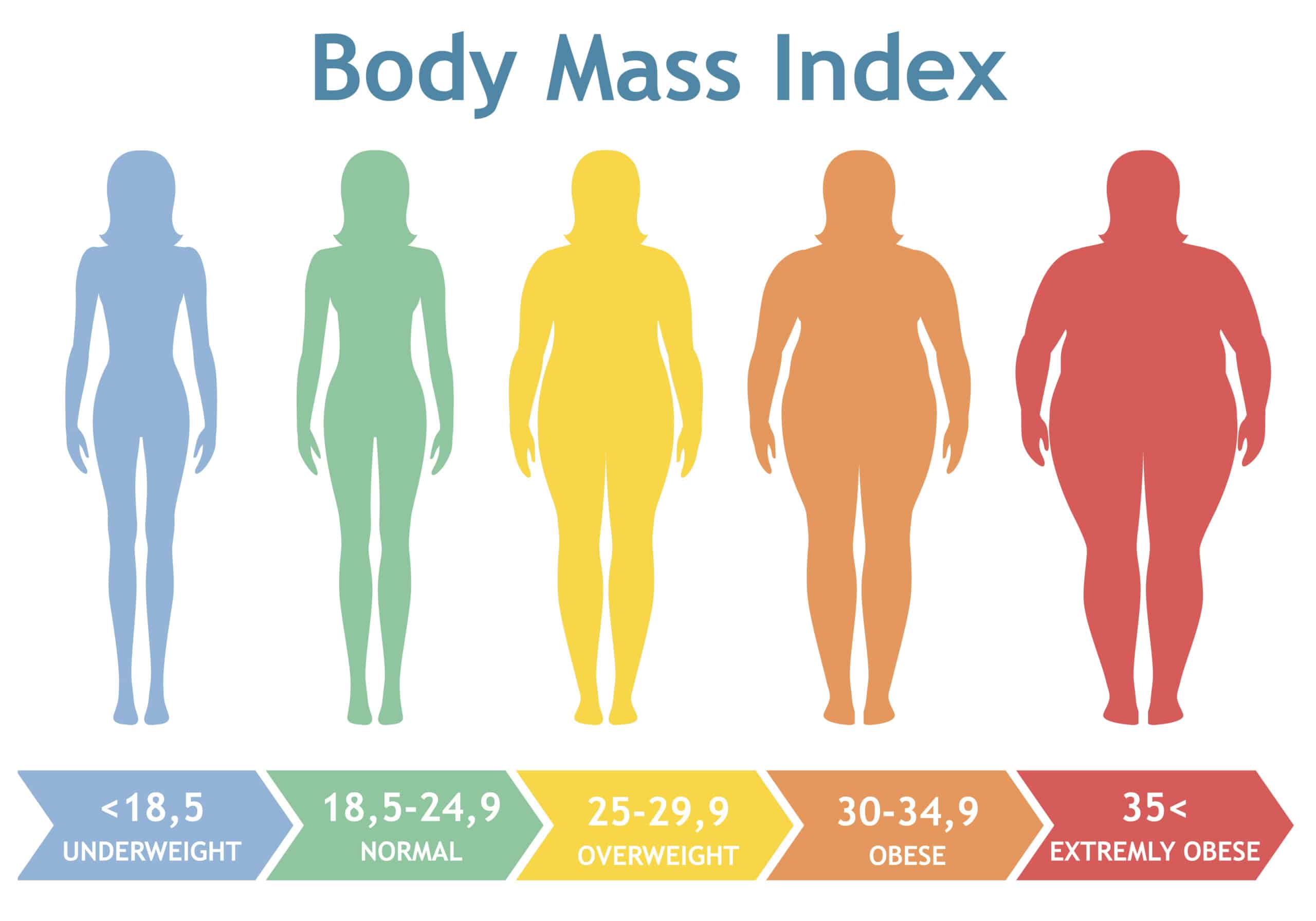There’s an epidemic in America concerning weight. Over the past 40 years, the prevalence of being overweight or obese has increased by over 50% in the U.S., which means that almost 2 out of every 3 Americans are now either overweight or obese. Unfortunately, there appears to be no end in sight, and statistics show that the next generations will be equally if not even more overweight and obese.
There are many health complications associated with being overweight or obese. In particular, the combination of pregnancy and being overweight can equal many problems. Those who are looking to get pregnant or are already pregnant will need to be even more alert and aware of their health, as they are more prone to pregnancy complications.
What Does It Mean to Be Overweight When Pregnant?

Whether or not you’re overweight is not determined by your weight while pregnant, but your weight prior to getting pregnant. Most health experts will determine whether you are overweight or not based on your body mass index (BMI), which measures your weight against your height. You can use this calculator from the National Heart, Lung and Blood Institute to determine your BMI.
Let’s take a look at the weight status of different BMI scores below:
- Under 18.5 is considered underweight. Most doctors would recommend putting on some weight before getting pregnant.
- 5 to 24.9 is considered normal. Those who fall in this range don’t have to make any dietary changes.
- 25 to 29.9 is considered overweight. Overweight patients may need extra care when pregnant. They should speak with a doctor for a more accurate diagnosis.
- Anything greater than 30 is considered obese. Obese women are at risk for developing more health complications. Their babies also need extra medical supervision, as they may be more prone to certain illnesses and conditions.
One problem with BMI is it doesn’t distinguish between the different types of body mass. For example, it can’t tell whether the weight is from fat, muscle or skeletal tissue. Muscle weighs more than fat, and it’s not uncommon for athletes to be considered overweight or obese although they’re perfectly healthy. With that said, it’s typically a reasonably accurate guide for your average person.
Complications Associated With Being Overweight or Obese

Being overweight or obese during pregnancy is not good for either the mother or the baby. Both the mother and the baby are more likely to struggle with health complications during the pregnancy when the mother is overweight, and will need additional medical care. The mother and the baby will also struggle with different types of health complications, the type of which will vary from one individual to another.
At times, health complications may only afflict the mother or the baby. Some mothers may need to take prescription medications to manage the complications that arise from being overweight, and these prescription medications may come with unwanted side effects.
Complications Affecting the Mother
If you’re overweight or obese, pregnancy can be really hard on your body. You’ll be more likely to experience the following complications:
- Gestational diabetes. Those who get gestational diabetes will have a higher risk of developing type II diabetes in the future. They’ll also be more likely to develop gestational diabetes during future pregnancies.
- High blood pressure and preeclampsia. Preeclampsia is usually associated with high blood pressure. After the 20th week of conception, those who are overweight and struggling with high blood pressure may notice signs of organ failure. The most common organs affected include the kidneys and the liver.
- Blood clotting problems. This is also often attributed to high blood pressure, which is itself caused by being overweight. Overweight mothers are also more likely to develop a blood clot problem known as venous thromboembolism. This is when a small piece of a blood clot breaks off from the actual clot and travels to other organs, like the brain, lungs or heart.
- Difficulties giving birth. Overweight mothers are more likely to be pregnant past their due date or experience a longer labor. Their body fat may prevent the baby from easily exiting through the pelvis, so they may need to give birth via a cesarean birth instead.
- Increased risk for developing a sleep disorder known as obstructive sleep apnea. Overweight pregnant mothers may stop breathing while they’re sleeping.
Those who are going through pregnancy while overweight will also often find that they will have difficulties losing weight after giving birth. They may also have problems breastfeeding, as their breasts may not produce enough milk for the baby. These mothers are also more susceptible to miscarriages and stillbirths.
Being Overweight Can Affect Fertility
If you’re overweight or obese, you’ll have a much more difficult time getting pregnant because of the imbalanced hormone levels in your body. Your progesterone and estrogen levels trigger ovulation and fertility; however, if you’re overweight or obese, your fat cells will produce much higher estrogen levels, which will basically make your body less fertile. You’ll experience less regular ovulation and menstrual cycles, which will make it much harder to conceive.
On top of this, obesity and being overweight also has a negative impact on in vitro fertilization (IVF) treatments. If you have a high BMI, you are less likely to conceive successfully with IVF.
Complications Affecting the Baby
Babies of pregnant mothers are more likely to struggle with pregnancy complications. The severity of the complications will vary and depend on the health of the mother, her general weight, and her habits while pregnant. Some of the most common pregnancy complications affecting the baby that are associated with having an overweight mother include:
- Birth defects. Babies born to overweight mothers are more susceptible to developing neural tube defects and cardiac defects.
- Macrosomia. This is when the baby weighs more than 8 pounds and 13 ounces. Macrosomia complications include labor problems, like shoulder dystocia and other birth injuries, and genital tract lacerations to the mother. Some mothers will also experience increased bleeding after delivery.
- Premature birth. Depending on how early the baby was born, not all of their organs may be fully developed. In worst-case scenarios, premature birth can lead to stillbirth.
- Problems associated with the mother having gestational diabetes. As mentioned above, pregnant mothers who are overweight are more likely to develop gestational diabetes. If the mother has gestational diabetes, the baby will be more likely to have breathing problems, low glucose levels and jaundice.
In addition to the issues mentioned above, extra abdominal padding can make it hard for health professionals to detect the baby’s size and health during ultrasound appointments. Due to this reason, some complications may not be detected early on.
Should You Lose Weight While Pregnant?

Even if you’re overweight or obese, you should not try to lose weight by dieting if you’re already pregnant. Dieting while pregnant may harm the baby, as you might not be getting enough nutrients. Pregnant women need more nutrients to support the baby’s development.
Insufficient nutrients can result in birth defects. For example, insufficient folic acid intake can lead to neural tube defects in the baby, as folic acid is necessary for healthy development of the spine, brain and nervous system.
Recommended Weight Gain
Instead of losing weight during your pregnancy, you should be gaining weight even if you are overweight or obese. If you’re overweight or obese, you’ll need to be under more care from a healthcare provider to ensure that the weight gain is not damaging to your baby. Gaining the right amount of weight can help reduce pregnancy complications.
Although the situation will vary from one pregnant mother to another, here are the basic guidelines for those who are obese or overweight:
- Gain 15 to 25 pounds throughout your pregnancy if your BMI falls in the overweight category. If you’re pregnant with twins, you’ll want to double this amount and try to gain 31 to 50 pounds.
- Gain 11 to 20 if your BMI falls in the obese range. If you’re pregnant with twins, you should try to gain anywhere from 25 to 42 pounds.
These are just general guidelines. If you are eating healthy and exercising more, you might find yourself losing weight when pregnant. Although this is not recommended, it may not necessarily be harmful to your baby. You will need to talk to your healthcare provider to make sure that your baby is developing properly and healthily.
What to Do Instead
Although most experts do not recommend trying to lose weight when pregnant, they will recommend that you make some dietary and lifestyle changes to be healthier. These changes will be beneficial for both you and the baby. Let’s take a look at some of the most common recommendations made by healthcare experts below.
Exercise More
Even if you weren’t exercising prior to getting pregnant, now is a great time to start. Exercising when pregnancy can help ease back pain, increase your energy and decrease constipation and swelling. It can also promote better sleep.
The key to exercising while pregnant is to take it easy. Don’t try anything too strenuous, especially if you didn’t exercise much before. Go out for a brisk walk every day or try prenatal yoga. Swimming is also highly recommended because it’s easy on the joints and can help relieve water retention during pregnancy.
Most experts recommend making minor lifestyle changes first. For example, consider taking the stairs instead of the elevator. You might also want to park further from stores, so you can walk a little bit further. Some people may join a prenatal yoga class, so they have more structure and routine in their lives.
Watch Your Diet
While pregnant, more than ever, you need to watch your diet and make sure that you’re eating nutritious, balanced meals. You need to make sure that you’re getting enough nutrition for not only yourself, but also for your baby. You should speak with a healthcare professional or a dietician to figure out what your new nutritional requirements may be.
Although you shouldn’t go on a restrictive diet, make sure that you eat more leafy greens and foods that are rich in fiber. Opt for lean meat and poultry instead of bacon and fattier cuts, and add more healthy fats, like salmon and avocados, to your meals. You should also keep a food diary to record what you are, so you know whether you’re getting enough vitamins and minerals.
Make sure to take prenatal supplements as well for extra insurance. You should consider taking supplements that will add more folic acid, magnesium, calcium and vitamin D to your diet.
Get Regular Prenatal Care
Regular prenatal care will keep you and your baby healthy, as it gives your healthcare provider more chances to spot pregnancy and health complications while they’re still minor. Ideally, you should speak with a healthcare provider before getting pregnant to see whether there are any complications that you need to be aware of. You should also get early testing for gestational diabetes and get screened for obstructive sleep apnea.
If you’re losing weight while pregnant due to healthier lifestyle changes, you’ll also want to get regular prenatal care to confirm that your baby is developing healthily.
Final Thoughts

If you’re overweight or obese, you’ll need to pay even more attention to your nutritional intake and your body when you’re pregnant. If you’re not pregnant just yet, consider losing weight before you try to conceive. You and your baby will experience fewer complications during the pregnancy, which is already a stressful enough time by itself.
With proper care and some precautions, overweight women can have a very smooth pregnancy, avoiding pregnancy complications for both them and their baby.
